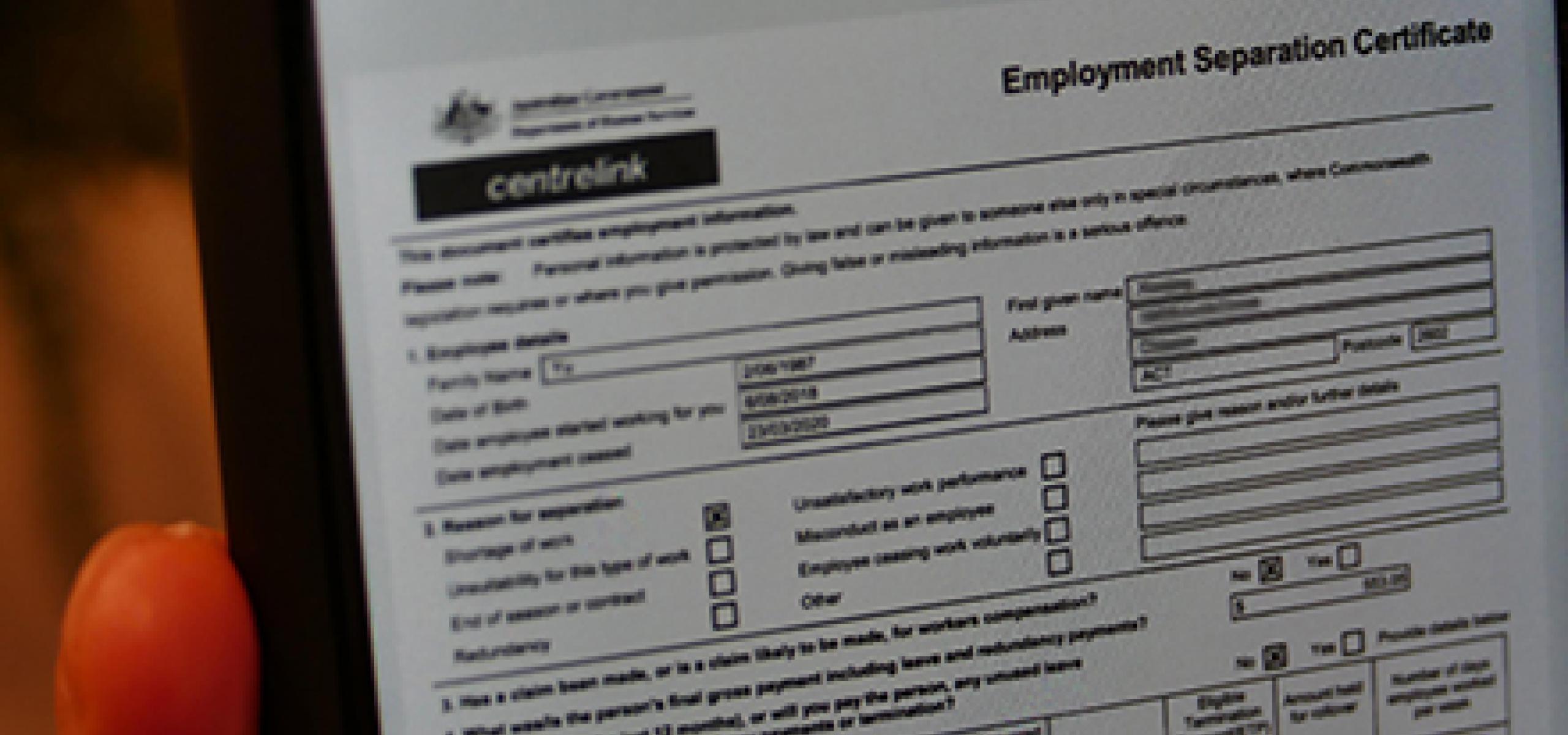
Centrelink applicants now no longer need to provide a bank statement, Employment Separation Certificate (above) or proof of rental arrangement. Photo: Tom Fearon/ANU
Previously, our firm handled three to four major investor visas per week. This has essentially stopped.
COVID-19 has affected us all and raised many legal questions about day-to-day life. For many Australians, housing and employment have been two areas most fraught with uncertainty.
Pierre Johannessen (GDLP ’16) is a partner at Johannessen Legal, an international boutique law firm with a Canberra office. In this Q&A, he answers some of the most common questions he receives from clients.
Pierre Johannessen (GDLP '16)
1) When can my employer let me go and what are the considerations they need to make?
Firstly, it’s important to distinguish between being stood down and terminated. Being stood down means you are still employed, albeit with greatly reduced or no working hours. For employers, a downturn in business is not sufficient cause to stand down employees. The key question to ask is, “Has there been a stoppage of work?”
In the hospitality industry, we’ve seen many businesses transition from dine-in to takeaway establishments. For employers, this change reflects a “stoppage” of work beyond their control in the sense that they can no longer have wait staff.
Secondly, “useful work” is the barometer that has to be tested by employers during a stoppage of work. This might result in, say, a restaurant manager being required to perform duties outside of their regular work, such as cleaning out the kitchen. Once this “useful work” is exhausted, employees can be stood down.
2) Can employees receive their entitlements prior to being stood down?
Absolutely. Businesses should put employees on paid leave where available before standing them down.
3) What lessons in communication can law students learn from COVID-19?
Law students should remember that “legalese” and “government-speak” are not the norms for everyday people. Miscommunication and conflicting advice from the top has been a key source of frustration. Barbers and hairdressers, in particular, have been unclear about whether they are permissible businesses.
The government directives of having one person per four square metres and limiting appointments to 30 minutes translates into a stoppage of work for most barbershops and hairdressing salons. Haircuts for women, in particular, may take two hours: cleaning, washing, cutting, colouring, drying – these are all segments of the same action.
4) What happens to my invoices and can I get my bills paid?
From a legal standpoint, excluding banking and finance, standard rules per industry still apply. If someone is required to pay an invoice within 14 or 21 days, that debt still stands. The reality is that COVID-19 has huge flow-on effects that impact contractors, sub-contractors and so on.
I encourage clients to adopt a more community- and societal-oriented view rather than a strictly legal one at this point. Enforcing a debt now might cause a debtor bankruptcy, which may not benefit the debtee in the long term.
5) What if I can’t pay my rent or lease?
Currently, eviction has been limited where the tenant is unable to pay rent as a result of losing their employment. We have seen some landlords be quite generous, with some offering blanket reductions in rent for a few months or asking businesses to provide financial statements of downturn to adjust rents. Our economy is entirely based on someone down the line paying their debt. If we get in a situation where no one can pay their debts, it doesn’t benefit anyone to bankrupt someone.
Law students studying equity and trusts will be able to appreciate the importance of considering what is “equitable”. When these matters go to court and a renter or leasee’s defence is [the financial situation] was “beyond my control”, that may be considered more than reasonable.
6) I’m from overseas and my visa depends on me working or investing in Australia. What are my options?
This is an obvious and understandable fear among visa holders, especially those whose visas are due to expire soon. Previously, our firm handled three to four major investor visas per week. This has essentially stopped.
If you’re on a working or temporary working holiday visa and have lost work but wish to stay in Australia, there is some good news in that the Department of Home Affairs has placed a temporary suspension on conditions. You can apply for a tourist visa and receive a bridging visa in the interim and not have to leave the country.
This Q&A is provided for general information and educative purposes. The content does not constitute legal advice or recommendations and should not be relied upon as such. Appropriate legal advice should be obtained in actual situations.
